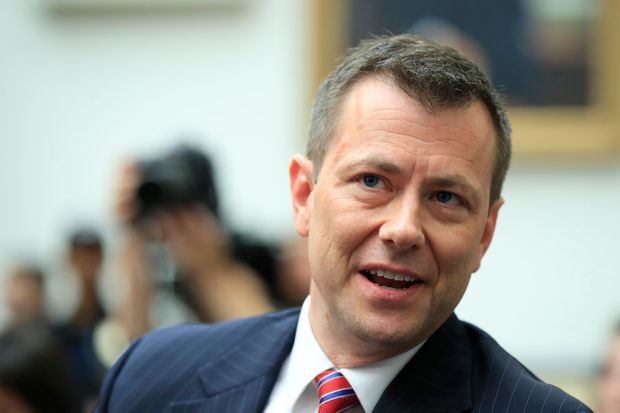
America is in trouble if a former top FBI counterspy believes the silliness in his book.
Former FBI Deputy Assistant Director Peter Strzok on Capitol Hill, July 12, 2018.
Photo: Manuel Balce Ceneta/Associated Press
Contrary to a media chorus, the Justice Department inspector general did not find the FBI handling of the Clinton and Trump cases free of “political bias.”
He found no “documentary or testimonial evidence” of such bias to explain actions for which “no satisfactory explanations” were offered. Obama appointee Michael Horowitz detailed at great length a series of chaotic, insubordinate and unprincipled acts by FBI bureaucrats navigating 2016’s treacherous waters.
One of these officials was Peter Strzok, as you know too well. All of us, even in modestly sensitive positions, are constantly reminded about compromising personal behavior on company networks. And yet, using an FBI messaging system, he not only conducted an extramarital affair with a colleague, not only engaged in prejudicial political banter, but did so while leading supremely sensitive FBI investigations into both major-party candidates in the middle of a presidential election.
His comeuppance was unsurprising and now he’s contributing, on behalf of Democrats, to a campaign to delegitimize the next election if their guy doesn’t win.
In a book and media interviews, Mr. Strzok seeks to rehabilitate himself by supporting with fresh innuendo a Christopher Steele allegation that many in Washington incautiously associated themselves with. To wit, Donald Trump, while not technically a Kremlin agent, is “compromised” because of his business dealings, or because the Kremlin has dirt on him, or because he lied about a proposed Trump Tower in Moscow in the 2016 campaign and the Kremlin knows he lied.
If Mr. Strzok really believes what he’s saying (and I doubt it), he’s a fool.
First of all, there is now a record, and the Trump administration looks a lot like its predecessors, except with more stick and less carrot. Mr. Trump gave antitank missiles to Ukraine, his Mideast diplomacy is transforming the region despite Mr. Putin’s Syria intervention, and he’s making real headway in depriving the Kremlin of its precious Nord Stream 2 gas sales to Germany.
Is Mr. Trump unduly deferential to Vladimir Putin? Exaggerated politesse is not exactly unusual among world leaders. And, wisely or not, Mr. Trump has made it clear he believes that authoritarians, acting under fewer constraints, can more readily make deals based on personal rapport. He has also been flattering to Xi Jinping, Kim Jong Un and Turkey’s President Erdoğan.
Mr. Strzok’s answer: They must have something on Mr. Trump too.
Look, all politicians have secrets and private interests but Mr. Trump has bigger problems in this regard from his niece than from Mr. Putin. Mr. Strzok glibly calls Russia our “historic adversary,” but there is no Shield of Zoltar that Mr. Trump can betray to Mr. Putin to fulfill his dreams.
Our relations are conditioned by a single fact: Mr. Putin’s need for an enemy manqué to justify his murderous kleptocracy as providing some kind of “stability” for the Russian people. And it’s going to remain that way for a while regardless of who the U.S. president is.
One big and relevant exception proves the rule against Mr. Strzok’s cheap spy novel theory of international relations. Try finding, in any official U.S. document, speech or hearing testimony, a telling hint about the Russian apartment bombings of 1999, which killed hundreds of Russians in their beds, were blamed on Chechen terrorists, and launched Mr. Putin’s rise to permanence.
Then, in early 2017, Republican Sen. Marco Rubio broke the 18-year silence by asking Trump cabinet nominee Rex Tillerson about a “incredible body of reporting” suggesting the attacks were carried out by the Kremlin itself.
As if prepped, Mr. Tillerson responded: “Those are very, very serious charges to make. . . . I understand there is a body of record in the public domain. I’m sure there’s a body of record in the classified domain.”
This might have been the beginning of the end of Mr. Putin’s acceptability as an interlocutor but the moment disappeared as quickly as it came, albeit after letting Mr. Putin know he had crossed a line and called too much attention to himself.
Mr. Trump’s own advent in our political life has been cacophonous for revealing much to the dishonor of people we once might have been inclined to honor: Mr. Strzok, James Comey, Adam Schiff, many news reporters.
The recent press interviewers who have been such unpenetrating enablers of Mr. Strzok’s McCarthyism are one more case in point. For the truly disgraceful aspect here is the efforts of people like Mr. Strzok, Lt. Col. Alexander Vindman (who calls the president Mr. Putin’s “useful idiot”) and others to label Mr. Trump a traitor because he insists on pursuing the policies he explicitly sold the American people. You don’t have to agree with Trump priorities but Mr. Strzok et al.’s method of disagreeing is slimy.

